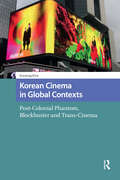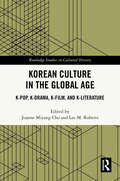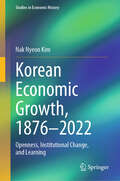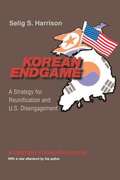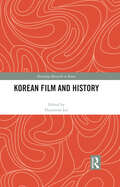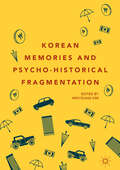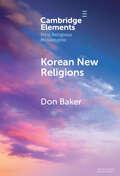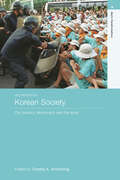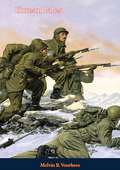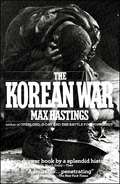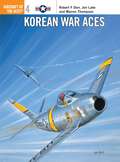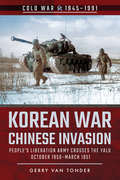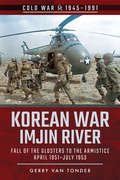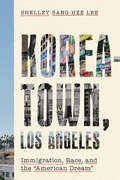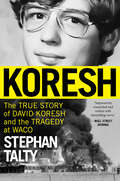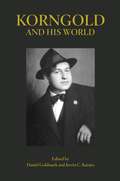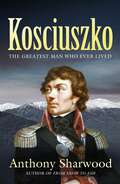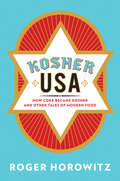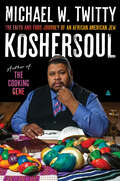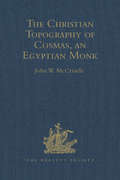- Table View
- List View
Korean Cinema in Global Contexts: Post-Colonial Phantom, Blockbuster and Trans-Cinema (Critical Asian Cinemas)
by Soyoung KimOffering the most comprehensive analysis of Korean cinema from its early history to the present, and including the films of Park Chan-wook, Bong Joon-ho and Kim Ki-young, Korean Cinema in Global Contexts: Postcolonial Phantom, Blockbuster and Trans-Cinema situates itself in the local, Inter-Asian, and transnational contexts by mobilizing the critical frameworks of feminism, postcolonial critique and comparative film studies. It is attentive to an enmeshment of the cinematic, aesthetics, politics and cultural history.
Korean Crisis and Recovery
by David T. Coe Se-Jik KimThis volume contains papers presented at a May 2001 conference in Seoul sponsored by the IMF and the Korea Institute for International Economic Policy on the Korean Crisis and Recovery. The papers examine the response to the 1997 crisis, its long-term impact on growth, and the state of financial and corporate sector reforms. Authors include academics, Korean policymakers, and IMF and World Bank staff involved in the Korean program. [from the IMF website]
Korean Culture in the Global Age: K-Pop, K-Drama, K-Film, and K-Literature (Routledge Studies in Cultural History)
by Joanne Miyang Cho Lee M. RobertsSince the late 1990s, South Korean cultural products such as pop music, TV drama, and film have shaped the country’s image around the world. This book explores these three internationally best-known media of the Korean Wave global phenomenon, along with a less commonly featured aspect, K-literature.Iconic images of South Korea today include stylish music groups like BTS and Blackpink, appealing dramas, and a range of films and digital comics (manhwa). Alongside associations with glitz and glamor are darker impressions: continuing political division, malaise over a war that never really ended. Korean Culture in the Global Age focuses on these and other facets of South Korea’s constantly changing international image to show how it has come to command worldwide attention. In recent years, readers in a growing number of languages have discovered the talent of South Korean authors through the efforts of countless translators. Showing developments in and occasional connections between themes in K-pop, K-drama, K-film, and K-literature, the book provides a more comprehensive view of contemporary South Korean culture.This volume will interest researchers and students of Korean Studies, Asian Studies, Asian American Studies, popular music, film studies, migration and diaspora studies, and world literature.
Korean Economic Growth, 1876 - 2022: Openness, Institutional Change, and Learning (Studies in Economic History)
by Nak Nyeon KimThis book provides the first comprehensive explanation of Korea’s 150 years of economic growth, from the opening of the ports to the present, based on consistently organized long-term statistics. The book also compares Korea’s experience with that of other countries. During this period, Korea experienced major systemic transitions, from a traditional society to colonial rule, and after liberation, the division between North and South Korea. East Asian latecomer nations, including Korea, rapidly closed the gap with advanced countries through learning and adaptation following their opening to the world. The book uses Korea’s case to demonstrate how institutional changes influence economic performance and explain the conditions under which rapid catch-up growth can occur or fail to occur. Korea’s high growth was achieved under an authoritarian regime with state-led industrial policies. As the limitations of this model became evident, Korea transitioned to a private-sector-led approach, facing economic crises in the process. Economic growth led to the rise of a highly educated middle class. This, in turn, surfaced demands that had been suppressed under the authoritarian regime, paving the way for democratization. Social development and fairness, long overshadowed by economic growth, became key policy agendas. Following the 1997 Asian financial crisis, Korea has faced the dual challenges of slow growth and rising inequality, driving increased calls for income redistribution and the establishment of a Korean-style welfare state. The book is divided into two parts. Part 1 explores long-term trends in Korea’s economic growth, comparing them with other countries. Part 2 provides a detailed, stage-by-stage analysis, highlighting the specific institutional and policy changes that shaped Korea’s development.
Korean Endgame: A Strategy for Reunification and U. S. Disengagement
by Selig S. HarrisonNearly half a century after the fighting stopped, the 1953 Armistice has yet to be replaced with a peace treaty formally ending the Korean War. While Russia and China withdrew the last of their forces in 1958, the United States maintains 37,000 troops in South Korea and is pledged to defend it with nuclear weapons. In Korean Endgame, Selig Harrison mounts the first authoritative challenge to this long-standing U.S. policy. Harrison shows why North Korea is not--as many policymakers expect--about to collapse. And he explains why existing U.S. policies hamper North-South reconciliation and reunification. Assessing North Korean capabilities and the motivations that have led to its forward deployments, he spells out the arms control concessions by North Korea, South Korea, and the United States necessary to ease the dangers of confrontation, centering on reciprocal U.S. force redeployments and U.S. withdrawals in return for North Korean pullbacks from the thirty-eighth parallel. Similarly, he proposes specific trade-offs to forestall the North's development of nuclear weapons and missile delivery systems, calling for the withdrawal of the U.S. nuclear umbrella in conjunction with agreements to denuclearize Korea embracing China, Russia, and Japan. The long-term goal of U.S. policy, he argues, should be the full disengagement of U.S. combat forces from Korea as part of regional agreements insulating the peninsula from all foreign conventional and nuclear forces. A veteran journalist with decades of extensive firsthand knowledge of North Korea and long-standing contacts with leaders in Washington, Seoul, and Pyongyang, Harrison is perfectly placed to make these arguments. Throughout, he supports his analysis with revealing accounts of conversations with North Korean, South Korean, and U.S. leaders over thirty-five years. Combining probing scholarship with a seasoned reporter's on-the-ground experience and insights, he has given us the definitive book on U.S. policy in Korea--past, present, and future.
Korean Film and History (Routledge Research on Korea)
by Hyunseon LeeCinema has become a battleground upon which history is made – a major mass medium of the twentieth century dealing with history. The re-enactments of historical events in film straddle reality and fantasy, documentary and fiction, representation and performance, entertainment and education. This interdisciplinary book examines the relationship between film and history and the links between historical research and filmic (re-)presentations of history with special reference to South Korean cinema. As with all national film industries, Korean cinema functions as a medium of inventing national history, identity, and also establishing their legitimacy – both in forgetting the past and remembering history. Korean films also play a part in forging cultural collective memory. Korea as a colonized and divided nation clearly adopted different approaches to the filmic depiction of history compared to colonial powers such as Western or Japanese cinema. The Colonial Period (1910-45) and Korean War (1950-53) draw particular attention as they have been major topics shaping the narrative of nation in North and South Korean films. Exploring the changing modes, impacts and functions of screen images dealing with history in Korean cinema, this book will be of huge interest to students and scholars of Korean history, film, media and cultural studies.
Korean Folktales (The World's Greatest Myths and Legends)
by Flame TreeFrom the rift valley come stories of gods, tricksters, cattle and ogres from the many peoples of East Africa.Traditional stories bring a deeper understanding of the movement of peoples across East Africa. Common roots and differences between ancient peoples create a lively portrait with their fragile, powerful gods. The modern nations of Kenya, Tanzania, Uganda, Rwanda and more inherit the folk and mythic tales of the rift valley region. Here you'll find stories of ogres and tricksters, riddles and poems, figures such as the first man (Gikuyu) and woman (Mumbi), and great heroes of history such as Liongo. This new collection is created for the modern reader. FLAME TREE 451: From myth to mystery, the supernatural to horror, fantasy and science fiction, Flame Tree 451 offers a healthy diet of werewolves and mechanical men, blood-lusty vampires, dastardly villains, mad scientists, secret worlds, lost civilizations and escapist fantasies. Discover a storehouse of tales gathered specifically for the reader of the fantastic.
Korean Memories and Psycho-Historical Fragmentation
by Mikyoung KimThis pioneering book is the first English volume on Korean memories. In it, Mikyoung Kim introduces ‘psycho-historical fragmentation’, a concept that explains South Korea’s mnemonic rupture as a result of living under intense temporal, psychological and physical pressure. As Korean society has undergone transformation at unusual speed and intensity, so has its historical memory. Divided into three sections, on lingering colonial legacies, the residuals of the Cold War and Korean War, and Korea’s democracy movement in the 1980s, Korean Memories and Psycho-Historical Fragmentation aims to tell multi-layered, subtle and lesser-known stories of Korea’s historical past. With contributions from interdisciplinary perspectives, it reveals the fragmentation of Korean memory and the impact of silencing.
Korean New Religions (Elements in New Religious Movements)
by Don BakerKorea has an unusually diverse religious culture. In the north, Juche, which has taken on religious overtones, monopolizes articulations of beliefs and values as well as ritual practice. In the south, no single religion dominates, with over half saying that they have no specific religious affiliation. The remainder report being Protestant, Buddhist, and Catholic. Smaller in number but nonetheless noticeable are members of Korea's many home-grown new religious movements. Reflecting South Korea's religious diversity, some of those new religions have Buddhist roots, some have Christian origins, some draw on Confucian beliefs and practices, and some have emerged from Indigenous religious traditions such as shamanism. This Element examines the most noticeable of Korea's new religions to discover what they can tell us about distinctive traits of religion in Korea, and how Koreans have responded to the challenge posed by modernity to their traditional beliefs and values.
Korean Society: Civil Society, Democracy and the State (Asia's Transformations)
by Charles K. ArmstrongWhile most analyses of Korean politics have looked to elites to explain political change, this new and revised edition of Korean Society examines the role of ordinary people in this dramatic transformation. Taking the innovative theme of 'civil society' - voluntary organizations outside the role of the state which have participated in the process of political and social democratization - the essays collected here examine Korea as one of the most dramatic cases in the world of ordinary citizens participating in the transformation of politics. Key topics discussed include: comparisons of Korean democratization to the experiences of post-authoritarian regimes elsewhere in the world comparisons of the theory of civil society as developed in Western Europe and America the legacy of Korea's Confucian past for contemporary politics and society close examinations of various civil society movements South Korea and North Korea. Conceptually innovative, up-to-date and timely, the new edition of this book will be an invaluable resource for students of contemporary Korea, Asian politics and the global struggle for democracy.
Korean Tales
by Melvin B. VoorheesThis book is a first-hand account, based on personal experiences and observation, of a war unique in history and vital for the future of our civilisation. Part of the book is written in the form of fictional stories, each closely based on actual events, which reveal vividly the reactions of the fighting men and of the natives of a war-torn country.“THIS is a blessed event. At last the United States Army has given birth to a top-grade writer. From the Korean war has come finally one thin volume of prose which is apt to be remembered long after we have forgotten the heroisms of Heartbreak Ridge and the frustrations of Panmunjom.”—NY Times
Korean War
by Max HastingsIt was the first war we could not win. At no other time since World War II have two superpowers met in battle.Now Max Hastings, preeminent military historian takes us back to the bloody bitter struggle to restore South Korean independence after the Communist invasion of June 1950. Using personal accounts from interviews with more than 200 vets--including the Chinese--Hastings follows real officers and soldiers through the battles. He brilliantly captures the Cold War crisis at home--the strategies and politics of Truman, Acheson, Marshall, MacArthur, Ridgway, and Bradley--and shows what we should have learned in the war that was the prelude to Vietnam.
Korean War Aces
by Chris Davey Robert DorrThe first virtually all-jet war, the conflict in Korea saw F-86 Sabres of the USAF take on MiG-15s of the North Korean and Chinese air forces. Although the Allied pilots were initially taken aback by the ability of the communist fighter in combat, sound training and skilful leadership soon enabled Sabre pilots to dominate the dogfights over the Yalu River. In all 39 F-86 pilots achieved ace status, and a number of these are profiled in this volume, as are notable pilots from the US Navy, Marine Corps and Royal Navy and, for the first time, the handful of MiG-15 aces.
Korean War—Chinese Invasion: People's Liberation Army Crosses the Yalu, October 1950–March 1951 (Cold War, 1945–1991)
by Gerry van TonderAn examination of the causes and the direct outcome of North Korea’s seemingly unstoppable thrust down the Korean Peninsula in 1950.In his first four volumes on the Korean War, the author traces the war’s progress from the North Korean invasion of June 1950, the desperate American defense of the Pusan Perimeter, General Douglas MacArthur’s daring and highly successful amphibious offensive at Inch’on, and his subsequent advance across the 38th Parallel to the Yalu River on the Chinese Manchurian borderCommunist Chinese forces, that have been secretly infiltrating North Korean territory by slipping across the Yalu from mid-October 1950, ambush a South Korean regiment in the mountains of central North Korea. This is the first of several Chinese victories over unsuspecting and overstretched South Korean and American units in the winter of 1950-1951.On November 27, 1950, Chinese leader Mao Zedong, ostensibly fearful of the consequences of hostile American forces on his country’s border along the Yalu River, orders 250,000 troops into Korea, with express orders to annihilate the UN forces. In the western half of the theater, U.S. General Walton H. Walker’s Eighth Army front along the Ch’ongch’on axis is breached, while to the east, the U.S. X Corps suffers a series of crushing defeats, including at the Chosin Reservoir, precipitating a massive evacuation from the North Korean port of Hungnam.Praise for Korean War - Chinese Invasion"An extraordinarily informative and exceptionally well written, deftly organized and presented, detailed history.” —Midwest Book Review
Korean War—Imjin River: Fall of the Glosters to the Armistice, April 1951–July 1953 (Cold War, 1945–1991)
by Gerry van TonderAn in-depth look at the disastrous consequences of misjudgment and impulsiveness by the United States during the Korean War.As of October 1950, a quarter of a million Communist Chinese troops, in twenty-seven divisions, had poured across the Yalu River into North Korea, with the singular objective of forcing General Douglas MacArthur’s United Nations troops back across the 38th Parallel and into the Sea of Japan.Shortly before midnight on April 22, 1951, to the west of the U.S. Eighth Army’s defensive front, the Chinese Sixty-third Army fell on the British 29th Brigade. On the left flank, the 1st Battalion, Gloucester Regiment (“Glosters”) held a tenuous position at a ford on the Imjin River. Despite a gallant defense, the battalion was pushed back to make a desperate but futile stand on Hill 235. On what became known as “Glosters’ Hill,” the battalion ceased to exist. It was subsequently estimated that the attacking force of 27,000 Chinese troops suffered 10,000 casualties, forcing the Chinese army to be withdrawn from the front.From August 1951 to the summer of 1952, the USAF conducted Operation Strangle in a futile and costly attempt to disrupt Chinese supply routes. In the last two years of fighting, Communist Chinese and UN forces faced each other from well-entrenched positions in hilly terrain, where mapped hill numbers were contested. From June 1952 to March 1953, a series of five hard-fought engagements took place in central Korea as the antagonists sought ownership of Hill 266, commonly referred to as “Old Baldy.” This was followed during April–July 1953 by two tactically pointless battles over Pork Chop Hill, in which the UN forces won the first battle and the Chinese the second, with both sides sustaining major casualties. On July 27, 1953, the two belligerents signed an armistice agreement, implementing a ceasefire that stands to this day. De facto, the Korean War has never ended.
Koreans in Transnational Diasporas of the Russian Far East and Manchuria, 1895–1920: Arirang People (Routledge Studies in Modern History)
by Hye Ok ParkMuch attention has been paid to the Japanese deployment of Koreans in their war efforts during WWII. Much less attention, however, has been given to the subject prior to 1910. This book will: 1) present the evidence which reveals the presence of Koreans in the Japanese military during the Russo-Japanese War, 1904–1905, as seen by an American novelist Jack London, before the formal annexation of Korea by Japan, 2) analyze the presence of Koreans on the Japanese and the Russian sides of the war, and 3) investigate why and how these Koreans became involved in someone else’s war. Arirang, a Korean folksong favored and sung by Koreans at home and in exile, has sustained the Korean people in a shared, collective spirit throughout their lives in transnational diasporas in the Russian Far East, Manchuria, and Japan as well as in Korea. This is a study of transnational Koreans as the Arirang people: Chapter 1: Introduction, Chapter 2: Koreans in the Russian Far East and Manchuria, Chapter 3: Koreans in the Russo-Japanese War in 1904–1905, Chapter 4: Korean Transnationals as Stateless People, 1906–1920, and the Conclusion.
Koreatown Dreaming: Stories & Portraits of Korean Immigrant Life
by Emanuel HahnExplore and celebrate Korean culture in America through photographs and interviews by award-winning photographer Emanuel Hahn. "Photographer Hahn's animated and vivid debut . . . is exceptional." —Publisher's Weekly, Starred Review Since the first wave of Korean immigration in the early 1900s, Korean immigrants have opened and operated small businesses across the country that enrich the cultural fabric of our communities. Yet their stories are too often overlooked, as even today their existence is being pushed to the margins of American society. In Koreatown Dreaming, a project that began in Los Angeles and expanded to eight other cities, the lives of Korean immigrants are observed with care and admiration under Hahn's tender, capacious gaze. Hahn's arresting photographs and narrativized interviews portray Korean small business owners as key figures not just in their neighborhoods but in their own lives, where they experience personal struggle, sacrifice, triumph, growth, and joy.Koreatown Dreaming is at once an anecdotal history of Korean immigration and a touching homage to Korean immigrant life. These intimate stories of over 50 small businesses are a testament to the American Dream, even while complicating the illusions of that promise, and of what it means to be American. Cities featured: Los Angeles, California; Atlanta, Georgia; Annandale, Virginia; New York, New York; Flushing, New York; Pal Park, New Jersey; Fort Lee, New Jersey; Dallas, Texas; Honolulu, Hawaii.
Koreatown, Los Angeles: Immigration, Race, and the "American Dream" (Asian America)
by Shelley Sang-Hee LeeThe story of how one ethnic neighborhood came to signify a shared Korean American identity. At the turn of the twenty-first century, Los Angeles County's Korean population stood at about 186,000—the largest concentration of Koreans outside of Asia. Most of this growth took place following the passage of the Hart-Celler Act of 1965, which dramatically altered US immigration policy and ushered in a new era of mass immigration, particularly from Asia and Latin America. By the 1970s, Korean immigrants were seeking to turn the area around Olympic Boulevard near downtown Los Angeles into a full-fledged "Koreatown," and over the following decades, they continued to build a community in LA. As Korean immigrants seized the opportunity to purchase inexpensive commercial and residential property and transformed the area to serve their community's needs, other minority communities in nearby South LA—notably Black and Latino working-class communities—faced increasing segregation, urban poverty, and displacement. Beginning with the early development of LA's Koreatown and culminating with the 1992 Los Angeles riots and their aftermath, Shelley Sang-Hee Lee demonstrates how Korean Americans' lives were shaped by patterns of racial segregation and urban poverty, and legacies of anti-Asian racism and orientalism. Koreatown, Los Angeles tells the story of an American ethnic community often equated with socioeconomic achievement and assimilation, but whose experiences as racial minorities and immigrant outsiders illuminate key economic and cultural developments in the United States since 1965. Lee argues that building Koreatown was an urgent objective for Korean immigrants and US-born Koreans eager to carve out a spatial niche within Los Angeles to serve as an economic and social anchor for their growing community. More than a dot on a map, Koreatown holds profound emotional significance for Korean immigrants across the nation as a symbol of their shared bonds and place in American society.
Koresh: The True Story of David Koresh and the Tragedy at Waco
by Stephan Talty"Impressively researched and written with storytelling verve. ... Talty delves the deepest into the history and twisted personality of David Koresh." —Wall Street JournalThe first comprehensive account of David Koresh’s life, his road to Waco, and the rise of government mistrust in America, from a master of narrative nonfictionNo other event in the last fifty years is shrouded in myth like the 1993 siege of the Branch Davidians in Waco, Texas. Today, we remember this moment for the 76 people, including 20 children, who died in the fire; for its inspiration of the Oklahoma City bombing; and for the wave of anti-government militarism that followed. What we understand far less is what motivated the Davidians’ enigmatic leader, David Koresh.Drawing on first-time, exclusive interviews with Koresh’s family and survivors of the siege, bestselling author Stephan Talty paints a psychological portrait of this infamous icon of the 1990s. Born Vernon Howell into the hyper-masculine world of central Texas in the 1960s, Koresh experienced a childhood riven with abuse and isolation. He found a new version of himself in the halls of his local church, and love in the fundamentalist sect of the Branch Davidians. Later, with a new name and professed prophetic powers, Koresh ushered in a new era for the Davidians that prized his own sexual conquest as much as his followers’ faith. As one survivor has said, “What better way for a worthless child to feel worth than to become God?”In his signature immersive storytelling, Talty reveals how Koresh’s fixation on holy war, which would deliver the Davidians to their reward and confirm himself as Christ, collided with his paranoid obsession with firearms to destructive effect. Their deadly, 51-day standoff with the embattled FBI and ATF, he shows, embodied an anti-government ethic that continues to resonate today.Now, thirty years after that unforgettable moment, Koresh presents the tragedy at Waco—and the government mistrust it inspired—in its fullest context yet.
Korngold and His World (The\bard Music Festival Ser. #45)
by Kevin C. Karnes Daniel GoldmarkA brand-new look at the life and music of renowned composer Erich Wolfgang KorngoldErich Wolfgang Korngold (1897–1957) was the last compositional prodigy to emerge from the Austro-German tradition of Mozart and Mendelssohn. He was lauded in his youth by everyone from Mahler to Puccini and his auspicious career in the early 1900s spanned chamber music, opera, and musical theater. Today, he is best known for his Hollywood film scores, composed between 1935 and 1947. From his prewar operas in Vienna to his pathbreaking contributions to American film, Korngold and His World provides a substantial reassessment of Korngold’s life and accomplishments.Korngold struggled to reconcile the musical language of his Viennese upbringing with American popular song and cinema, and was forced to adapt to a new life after wartime emigration to Hollywood. This collection examines Korngold’s operas and film scores, the critical reception of his music, and his place in the milieus of both the Old and New Worlds. The volume also features numerous historical documents—many previously unpublished and in first-ever English translations—including essays by the composer as well as memoirs by his wife, Luzi Korngold, and his father, the renowned music critic Julius Korngold.The contributors are Leon Botstein, David Brodbeck, Bryan Gilliam, Daniel Goldmark, Lily Hirsch, Kevin Karnes, Sherry Lee, Neil Lerner, Sadie Menicanin, Ben Winters, Amy Wlodarski, and Charles Youmans.Bard Music Festival 2019Korngold and His WorldBard CollegeAugust 9–11 and 16–18, 2019
Kosciuszko: The incredible life of the man behind the mountain
by Anthony SharwoodHeroes are hard to come by - but there's one man whose legend has stood the test of two centuries, and whose name sits on Australia's highest peak. Tadeusz Kosciuszko: freedom fighter, friend of Thomas Jefferson and champion of liberty on two continents. Bestselling author Anthony Sharwood finds out why he's the hero the world needs right now.Kosciuszko - our iconic highest mountain - is a name familiar to all Australians. But how many people know who the mountain is named after?Tadeusz Kosciuszko, who lived from 1746 to 1817, is the most famous person Australians probably know absolutely nothing about. A military engineer, freedom fighter, and champion of human rights, this extraordinary revolutionary was crucial to the success of the American War of Independence, then bravely led an uprising against Russia and other invaders in his native Poland, promising freedom and equality to all who joined his cause.In his day, Kosciuszko was loved and respected across Europe and America. His great friend Thomas Jefferson called him 'as pure a son of liberty as I have ever known', while Kosciuszko would later challenge Jefferson to live up to the famous words 'All men are created equal' by bequeathing his American funds to free enslaved people, including those on Jefferson's plantation.Bestselling author Anthony Sharwood (From Snow to Ash; The Brumby Wars) has spent a lifetime walking, skiing and writing about Kosciuszko National Park. Now he sets off on the trail of the man himself, travelling across the USA, Poland and Switzerland to key sites in Kosciuszko's life. Returning to Australia where a potential name change from Mt Kosciuszko to an Indigenous name is hotly debated, he walks with the area's traditional owners and discovers the ancient history of Australia's highest peak.Kosciuszko's life and legacy is enthralling, inspiring and indispensable. But is that reason enough to keep his name on the mountain?
Kosher Style: Over 100 Jewish Recipes for the Modern Cook
by Amy RosenFor the bubbes and the balabustas, the keepers of Jewish kitchens and the enthusiastic neophytes, comes a cookbook that celebrates how many Jews eat today.In the Jewish culture, as in many others, bubbes, saftas and nanas are the matriarchs of the kitchen and thus the rulers of the roost. They are culinary giants in quilted polyester muumuus and silk slippers who know how to make the Semitic linchpins cherished from childhood--the kugel, the gefilte fish, the matzah ball soup and the crispy-skinned roasted chicken. They all have their specialties but, of course, they won't be around to feed us forever, and that will be a loss indeed. But it will be an even bigger loss if the recipes we grew up on pass away with them, along with those special connections to our past. That's what prompted Amy Rosen, journalist and cookbook author, to spirit the classic recipes from her grandmothers and other role models into the 21st century. All of the dishes in Kosher Style are inspired by the tables and tales and chutzpah of the North American Jewish experience. They also happen to be kosher. In this book are all the recipes you need for successful shellfish- and pork-free home entertaining, be it for a Jewish holiday or a workaday dinner. From crave-worthy snacks to family-size salads, soulful mains to show-stopping desserts, all of the recipes are doable in the home kitchen and are clearly marked as either a meat dish, dairy dish, or pareve (neutral). Think: Lacy Latkes & Applesauce, Sour Cream & Onion Potato Knishes, General Tso's Chicken, and Toblerone-Chunk Hamantaschen your family will plotz over. In addition to the classics, Amy has included some of her favorite modern recipes, like a Quinoa-Tofu Bowl with Greens & Green Goddess Dressing, Honey-Harissa Roasted Carrots and a Crisp Cucumber & Radish Salad. Kosher Style is for anyone who likes to cook and loves to eat, and it's especially for those yearning to create new shared memories around a table brimming with history, loved ones and maple-soy brisket.
Kosher USA: How Coke Became Kosher and Other Tales of Modern Food (Arts and Traditions of the Table: Perspectives on Culinary History)
by Roger HorowitzKosher USA follows the fascinating journey of kosher food through the modern industrial food system. It recounts how iconic products such as Coca-Cola and Jell-O tried to become kosher; the contentious debates among rabbis over the incorporation of modern science into Jewish law; how Manischewitz wine became the first kosher product to win over non-Jewish consumers (principally African Americans); the techniques used by Orthodox rabbinical organizations to embed kosher requirements into food manufacturing; and the difficulties encountered by kosher meat and other kosher foods that fell outside the American culinary consensus. Kosher USA is filled with big personalities, rare archival finds, and surprising influences: the Atlanta rabbi Tobias Geffen, who made Coke kosher; the lay chemist and kosher-certification pioneer Abraham Goldstein; the kosher-meat magnate Harry Kassel; and the animal-rights advocate Temple Grandin, a strong supporter of shechita, or Jewish slaughtering practice. By exploring the complex encounter between ancient religious principles and modern industrial methods, Kosher USA adds a significant chapter to the story of Judaism's interaction with non-Jewish cultures and the history of modern Jewish American life as well as American foodways.
Koshersoul: The Faith and Food Journey of an African American Jew
by Michael W. TwittyThe James Beard award-winning author of the acclaimed The Cooking Gene explores the cultural crossroads of Jewish and African diaspora cuisine and issues of memory, identity, and food.In Koshersoul, Michael W. Twitty considers the marriage of two of the most distinctive culinary cultures in the world today: the foods and traditions of the African Atlantic and the global Jewish diaspora. To Twitty, the creation of African-Jewish cooking is a conversation of migrations and a dialogue of diasporas offering a rich background for inventive recipes and the people who create them. The question that most intrigues him is not just who makes the food, but how the food makes the people. Jews of Color are not outliers, Twitty contends, but significant and meaningful cultural creators in both Black and Jewish civilizations. Koshersoul also explores how food has shaped the journeys of numerous cooks, including Twitty’s own passage to and within Judaism.As intimate, thought-provoking, and profound as The Cooking Gene, this remarkable book teases the senses as it offers sustenance for the soul.Koshersoul includes 48-50 recipes.
Kosma Aiguptiou Monachou Christianike Topographia - The Christian Topography of Cosmas, an Egyptian Monk (Hakluyt Society, First Series #98)
by John W. McCrindleTranslated from the Greek, and Edited, with Notes and Introduction. This is a new print-on-demand hardback edition of the volume first published in 1897.
